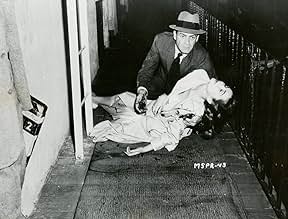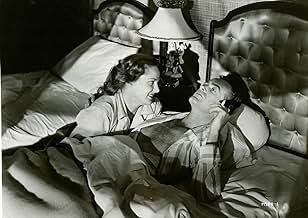In Arizona, a train's baggage car is robbed of a large payroll, prompting an investigation led by a railroad official-insurance investigator team.In Arizona, a train's baggage car is robbed of a large payroll, prompting an investigation led by a railroad official-insurance investigator team.In Arizona, a train's baggage car is robbed of a large payroll, prompting an investigation led by a railroad official-insurance investigator team.
Rodolfo Hoyos Jr.
- Lt. Castro
- (as Rudolpho Hoyos)
Robert Anderson
- Sheriff Jack of Winston
- (uncredited)
Raymond Bailey
- Sam Hendricks
- (uncredited)
Art Balinger
- Jail Officer
- (uncredited)
Howard Culver
- Pete the detective
- (uncredited)
Roy Glenn
- Train Porter
- (uncredited)
William Kendis
- Eddie, baggage handler
- (uncredited)
John Maxwell
- Train Conductor
- (uncredited)
Anna Navarro
- Mexican Bar Fly
- (uncredited)
- Director
- Writers
- All cast & crew
- Production, box office & more at IMDbPro
Featured reviews
The film gets off to a really good start. A slick crime with no clues appearing and you're wondering how the investigators are going to solve it. I'm thinking this is great (8 or 9 out of 10); a real puzzle but out of the blue they catch a member of the gang with no explanation as to how they found him. Then other members of the gang start making mistakes by not following orders. If the crime had been solved by deduction it could have been a great movie. Gripping start but soon disappoints.
You would think that by 1956 nobody could breathe new life into a train robbery tale. But in this film there are two major surprising twists, one near the beginning and then one smack in the middle.
Because half a million was taken in the robbery, a crack insurance investigator has his vacation to Mexico postponed to solve this crime. He is paired up with a bulldog of a railroad detective. Very shortly the pair determine that this crime was meticulously planned. But because it is obvious the crooks were working by a "time table" (thus the title), the railroad investigator says that is their weak link. Find a place where they couldn't make their time table, and the case should be something that can be cracked.
This is somewhat like a film noir and somewhat like a crime drama - a bit half and half. The interesting theme here is that of a normal middle class person turning to crime not because of one small bad decision snowballing or some life event causing a desperate need for money beyond their means, but because of living a life of "quiet desperation". Maybe this film is not remembered so much because that theme has become quite common in the decades that have passed. But in the "I Like Ike" 1950s, the idea of somebody not being happy with a chicken in their pot and their suburban tract home was almost blasphemy.
I'd highly recommend it. I haven't given too many details because to say much at all would spoil it for you.
A funny coincidence - Actor Raymond Bailey as the insurance company executive, calmly stating that if the crime cannot be solved and the loot recovered, then the company may have to pay out half a million. Bailey played skinflint banker Milburn Drysdale during the 1960s in the Beverly Hillbillies, and THAT character would have had a heart attack over losing such a sum!
Because half a million was taken in the robbery, a crack insurance investigator has his vacation to Mexico postponed to solve this crime. He is paired up with a bulldog of a railroad detective. Very shortly the pair determine that this crime was meticulously planned. But because it is obvious the crooks were working by a "time table" (thus the title), the railroad investigator says that is their weak link. Find a place where they couldn't make their time table, and the case should be something that can be cracked.
This is somewhat like a film noir and somewhat like a crime drama - a bit half and half. The interesting theme here is that of a normal middle class person turning to crime not because of one small bad decision snowballing or some life event causing a desperate need for money beyond their means, but because of living a life of "quiet desperation". Maybe this film is not remembered so much because that theme has become quite common in the decades that have passed. But in the "I Like Ike" 1950s, the idea of somebody not being happy with a chicken in their pot and their suburban tract home was almost blasphemy.
I'd highly recommend it. I haven't given too many details because to say much at all would spoil it for you.
A funny coincidence - Actor Raymond Bailey as the insurance company executive, calmly stating that if the crime cannot be solved and the loot recovered, then the company may have to pay out half a million. Bailey played skinflint banker Milburn Drysdale during the 1960s in the Beverly Hillbillies, and THAT character would have had a heart attack over losing such a sum!
This is a fast paced crime thriller involving a well synchronized heist of $500,000 from a train. Insurance investigator Charlie Norman (Stevens) and railroad detective Joe Armstrong (Calder) are called in to investigate the crime. The gang of thieves seem to have thought of everything and covered their tracks well. But then things start to unravel and the gang's leader kills one of gang members who is on the verge of telling all to the police. Armstrong is a dogged detective who pays attention to the smallest detail and whose motto is "There's no such thing as a perfect crime." That's certainly so in this case. Stevens does an okay job as Charlie Norman but he doesn't have a particularly striking screen presence and often delivers his lines too flatly. Even so, this movie has a couple of great twists and maintains interest throughout
Mark Stevens was a terrific film noir actor, reminding me of William Holden, but never an A-lister. This excellent movie that he made as producer, director and star for United Artists has the precision and impact of a Kubrick movie, and still packs a wallop 70 years after it was made.
The ingenious plotting and structure is different from the usual caper or trackdown movie, with enough twists and turns to keep me constantly guessing, and guessing wrong. The power of real B movies from the '40s and '50s is the tight characterizations, and what a treat to see John Marley a decade or so before his rise to prominence as such a distinctive character actor for Cassavetes and Coppola -here a great supporting role as one of the doomed criminals. Similarly, Jack Klugman is just right as a poor slob being interrogated.
The talent of Stevens on view here makes it such a shame that his career as a filmmaker didn't flourish -reminds me of my favorite character actor of the next generation, Steve Ihnat, who worked with Robert Duvall early in their careers but died young after only directing a couple of movies.
The ingenious plotting and structure is different from the usual caper or trackdown movie, with enough twists and turns to keep me constantly guessing, and guessing wrong. The power of real B movies from the '40s and '50s is the tight characterizations, and what a treat to see John Marley a decade or so before his rise to prominence as such a distinctive character actor for Cassavetes and Coppola -here a great supporting role as one of the doomed criminals. Similarly, Jack Klugman is just right as a poor slob being interrogated.
The talent of Stevens on view here makes it such a shame that his career as a filmmaker didn't flourish -reminds me of my favorite character actor of the next generation, Steve Ihnat, who worked with Robert Duvall early in their careers but died young after only directing a couple of movies.
It's remarkable how many actors from the Golden Age of Hollywood began or ended their careers making crime pictures ( or horror movies). Mark Stevens is a case in point. He began promisingly enough with the stylish noir The Dark Corner in 1946 and basically ended it with Timetable ten years later. Was he a classic Marlowesque private eye in the first one, in Timetable the rigors of maintaining a Hollywood career have visibly and morally taken their toll. Directed by Stevens himself, all the glamour of the classic noir is drained from both the look of the film as from the protagonists. Stevens has the look of a man who has seen too much and has basically given up hope that his life will change for the better. Even his last desperate attempt to turn his life around seems doomed from the start. Which is not helped by the strict moral code of the day that is constantly underlined, namely that Crime Doesn't Pay. The plot is a little convoluted, but then that's not what we watch these movies for. Stylistically it has little going for it,and small effort was made to avoid a stage-bound look. But the performances are adequate enough and especially Stevens is totally convincing as the world-weary protagonist. For noir fans this one is certainly worth a look.
Did you know
- TriviaThe $500,000 payroll stolen would be the equivalent of $4,400,000 in 2016.
- GoofsIn the robbery, Dr. Paul Brucker removes three small cash bags from the safe and puts them in his suitcase. But the heist was $500,000 in small bills. Even all new $20 bills wrapped and stacked together would make a pile more than nine feet high. With mixed used small bills ($5 to $20) that couldn't be traced, it would take a large suitcase to handle the money. And, it would weigh at least 60 pounds.
- Quotes
Joe Armstrong: There's no such thing as a perfect crime. Just a lucky one. But their luck will run out.
- ConnectionsFeatured in The World Famous Kid Detective (2014)
- How long is Time Table?Powered by Alexa
Details
- Release date
- Country of origin
- Official site
- Language
- Also known as
- Timetable
- Filming locations
- Production company
- See more company credits at IMDbPro
- Runtime
- 1h 20m(80 min)
- Color
- Aspect ratio
- 1.37 : 1
Contribute to this page
Suggest an edit or add missing content









































